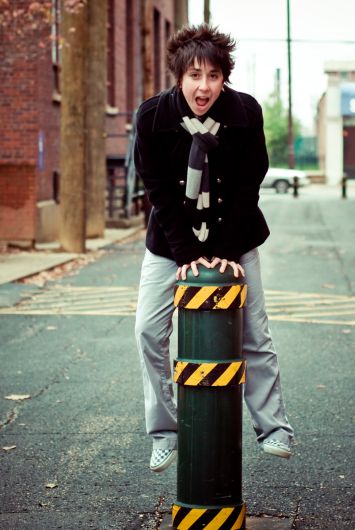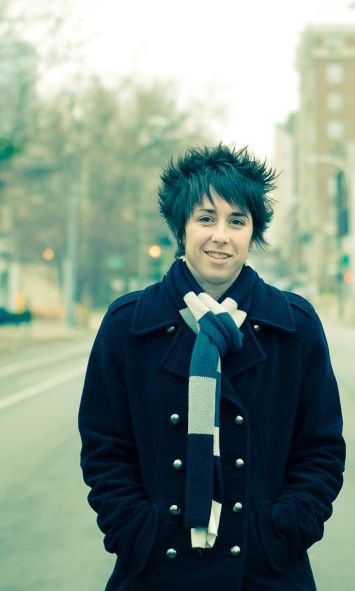social bookmarking tools:
 |
|
| Available RSS Feeds |
|---|
 - Top Picks - Top Picks |
 - Today's Music - Today's Music |
 - Editor's Blog - Editor's Blog
|
 - Articles - Articles
|
Add Louisville Music News' RSS Feed to Your Yahoo!
|

AMANDA LUCAS: CONFESSIONS OF A POPPIE!
By Tim Roberts
New York, London, Paris, Munich / Ev'rybody talkin' ‘bout pop muzik.
--M
The Three-Minute Pop Song. From 1905's chart-topping "Picnic for Two" back in the days of wax cylinders, to the erotic and infectious "Stacy's Mom," from Irving Berlin and Billy Murray to Adam Schlesinger and Butch Walker, and all the Sammy Cahns, Yip Harburgs, Henry Mancinis, John Lennons and Paul McCartneys, Carole Kings, and Paul Williamses in between. It is, arguably, the template on which the entire music industry is based. It has an amazingly simple structure, almost Platonic in balance and form: opening hook, first verse, chorus, second verse, chorus, bridge, third verse (optional), chorus repeat, and fade out. Within and among the structure are melodic hooks, harmonies, and lyrics that tell a story or present a state of being. The caveat: it must be direct, it must grab the listener's ear and not let go for at least 180 seconds, it must make the listeners tap their feet or bob their heads (lightly, of course), and it must finish with the type of sparkle and fizz that you'd get from a fresh, cold bottle of soda.
Put another way, "MacArthur Park" could never, ever be made into a three-minute pop song, even when the stuff was being played back on wax cylinders on machines that used needles as thick and round as the business end of a dart (and we can be glad we'll never have that recipe again).
And if you've done your job, the listeners will want to hear it again and again, no matter if the lyrics talk about love found or love lost. Couch it in a snappy song and no one will care.

"My producer described it as real-life lyrics full of hooks at catchy melodies," Amanda Lucas said of the current collection of pop on her debut release, Half Empty. "I felt that was a pretty good interpretation. All the songs are about experiences I've had. I've tried to be as honest as possible on every song. I think that's important."
Twenty-six years old, an Admissions counselor at Spalding University, small-framed with a thick shock of black hair that is swept up in Calvin-esque spikes (of Calvin and Hobbes, that is), Louisville native Amanda Lucas has burst onto the city's music scene on the strength of several solo performances and her work with folk band Two Cent Penny. The recent release of Half Empty underscores the speed at which her solo career has developed, and it shows that she knows the ingredients of the Three Minute Pop Song: opening riffs that snap you to attention (or, in some of the ballads, tap you on the shoulder), harmonies stitched together so tight that the song would fall into a pile of indistinguishable notes if they came unraveled, lyrics with a strong point of view, and an instrumental mix so clean and crisp you'd expect the recording to be sold in the produce section of a grocery store.
Lucas' story itself is the kind that gives hope to aspiring young musicians and impresses the old veterans. Some musicians fall through the cracks in this city like blades of dry grass. Lucas seems to have sprung up full-flowered and energized. Like any musician's story, hers is one that has unfolded over the past several years and involves the whole skill set of booking shows, playing clubs, and keeping a day job.
"I went to school at Lindsey-Wilson College," Lucas said, "and I worked down there for a year after I graduated. I played with a band out of Manchester, Kentucky called Altered. We played the Richmond area, London, Manchester, all down in the central and southern parts of the state. Once I moved back home, I was still playing with them. Then I met Audrey Cecil of Two Cent Penny. I had known her since I was 10. She found me on MySpace and told me she was playing music, too, and asked me to come sit in."

Lucas started out with Two Cent Penny, playing djembe and performing other background percussion. She later started booking shows for herself and as a duo with Cecil, a skill she had learned while doing the same for Altered. It was while she was booking herself that the first tiny seeds of what would eventually become Half Empty were scattered. And they found good soil.
"The places I was trying to book here required some kind of demo," Lucas said. "When I was playing with the band in Manchester, I had put together a seven-song acoustic demo. I had actually recorded it in a barn in Clinton County, Kentucky. I wasn't very happy with the quality. And I kept writing songs. I later put together a three-song demo. I burned all the CDs myself, made the cover myself, and sold them at my shows for two dollars, just to kind of get something back for all the money I'd put out. And every time, I'd keep hearing, ‘You should do a full-length or an EP.' So I kept that thought in the back of my head. And when I started playing out, I kept a separate account and started saving money."
Those savings allowed Lucas to pay cash for the production of Half Empty. Personal finance expert Dave Ramsey would be impressed.
Too many young musicians think small when they start out. Normally, that's the right direction to take: play a few gigs; develop an audience; find a producer or mentor to help you commit a portion of your material to an actual physical or digital recording (probably the biggest step, because hearing yourself recorded and played back for the first time can reveal all the nasty little warts on your sound and show how much work you really have to do, even though your friends have told you how "awesome you sound, man!"); build a catalog of material; then finally scrape together the funds to make a full-length recording.
Lucas followed those newbie's steps. For her, the first few happened quickly. By the time she was distributing her three-song demo, she was studio-ready with 15 songs. Then she approached producer Phil Bright of SupEARior Sound Studios.

"I wasn't going to do a full-length. I was going to do an EP. I took [Phil] about 15 of my songs, and he said, ‘Why don't we just record them all?' We ended up with 12."
Co-producer Bright became the Half Empty session bassist and guitarist. Lucas also had help from drummer Greg Unthank, violinist Jonathan Shippey, and her friend Audrey Cecil. The resulting 12 tracks on the recording follow the Three Minute Pop Song template (and, in a few instances, extend the length by about a minute; a small transgression, to be sure, but one that would not anger the spirits of Billy Murray and Irving Berlin). A handful of them manage to incorporate a coating of folk, such as "Chance" and "Kiss." One track, "Never Gone," is dedicated to the memory of her late grandfather.
"It definitely is pop-rock," Lucas said of the sound on Half Empty. "Some of the songs I wrote later on were more folky. Two Cent Penny is more of a folk band, so I was being exposed to artists I'd never heard of before, which is sad. So the last songs I wrote tend to lean toward folk-rock. But I'm a poppie at heart!"
But being a poppie at heart doesn't mean your worldview is all bubblegum and sunny days. The Three Minute Pop Song template is just that: a pattern, a blueprint that was probably set down as far back as when music was first performed. "Stacy's Mom" probably owes as much to the troubadours of southern France as to anything that came out of the Brill Building in the 1950s and 60s ("Darling Stacy, when the day's studies are complete / Might I visit the waters of your home / And your mother, has she returned from her travels? / Or is she hiding, refusing me to be shown?")
What goes into the template is completely up to the songwriter.
In the liner notes to Half Empty, Lucas gives her thanks to God, family, and friends, but later adds this:
Last but most certainly not least, I want to thank everyone who has ever cheated on me, hurt me and the select few of you who actually treated me right. Everything happens for a reason and this CD is the result of everything I've been through! (I promise I'm not bitter.)
Indeed, the CD's title itself should tell the listeners what they're in for.
"I'm a Capricorn," Lucas explained, "and I read that one of the main characteristics is that Capricorns see the glass as half-empty. And I started looking at my songs and thinking that some of these are pretty negative. And I thought that was a pretty big correlation between me and my songs. When I read that, I thought it was fitting. ‘Walk Away' is one of my most poppie numbers. It's about being cheated on. Listening to it, it sounds very happy. But when you listen to the lyrics, it's not happy at all."
The way Lucas infuses the bitterness of life into the springy energy of the pop-song template is similar to what Louisvillian Peter Searcy does with his music. And just the mention of Searcy's name caused Lucas to light up and glow like a pinball machine.
"I love Peter Searcy," Lucas gushed. "He is one of my favorites. I'm a big fan. I have been since I was in the eighth grade. My brother bought me Could You Please and Thank You. I went and saw him at his in-store performance at ear X-tacy when the CD came out. Any time I can see him, I will."
She also lists Matt Nathanson and Butch Walker as current power-pop performers she's currently listening to. International pop superstar Avril Lavigne is on that list, too, along with Michelle Branch.
"I like a lot of male artists," she admitted. "There aren't a lot of female artists out there who appeal to me. I like a little heavier rock, and there aren't a lot of female artists who can do that."
Now that Half Empty and a steady schedule of live performances have ensconced Amanda Lucas into the Louisville music scene, how does she feel about the scene itself? Many of those who are currently part of it have a laundry list of complaints ranging from cheap club owners to audiences who demand nothing but cover tunes (if they even show up at all). Lucas, however, is surprisingly optimistic and grateful.
"I think it's a great music scene," she said. "There are lots of people who are very supportive. We're playing out a lot to people who are very supportive of Louisville music, and that's been important to me. When you meet these people who are so supportive, it really helps your confidence and gives you the ability to put out a CD. When you have people who are behind you, like venue owners, that feels supportive as well."
Lucas is also planning a short tour of some venues in the south with her friend Audrey Cecil, including a competition at Eddie's Attic in Atlanta, and a live performance on the "Blue Plate Special" program on WDBX in Carbondale, Illinois. And the advice she gives to anyone wanting their shot in this business called music is keeping her both sane and busy.
"Don't expect immediate gratification, and don't expect the gratification to be material things. A lot of times we don't play for money. We play or tips or CD sales, which can be nonexistent. But the gratification I get is when I play one of my songs and I look out and see someone who knows the words singing along, or telling me later that a song helped them get through a breakup. That's my gratification: just for people to enjoy something that I wrote.
"It should not be about money. Sometimes that's few and far between, I think."
Amanda Lucas hopes you won't stay far between visits to her shows. Find out when and where she's playing at www.myspace.com/amandalucasmusic.
